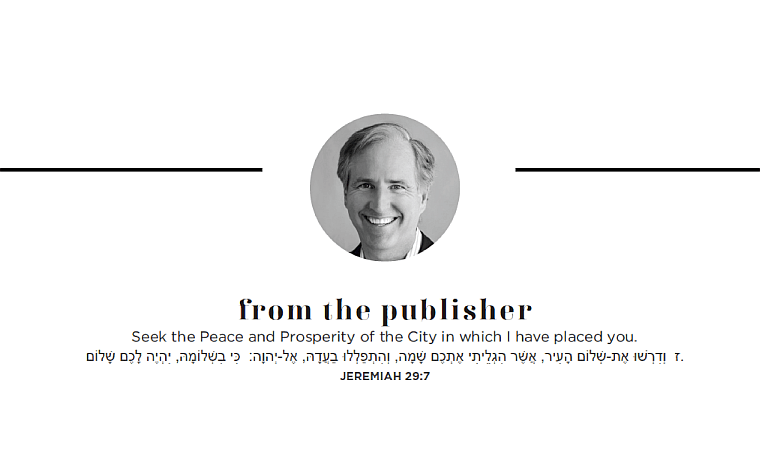Seek the Peace and Prosperity of the City in which I have placed you.
וְדִ רְ שׁוּ אֶת-שְ ׁלוֹם הָעִיר, אֲשֶ ׁר הִגְלֵיתִ י אֶתְ כֶם שָ ׁמָ ּה, וְהִתְ פַּלְלוּ בַעֲדָ הּ, אֶל-יְהוָה: כִּי בִשְ ׁלוֹמָ הּ, יִהְיֶה לָכֶם שָ ׁלוֹם ז
JEREMIAH 29:7
1 Peter 4:8
Above all, love each other deeply, because love covers a multitude of sins.
This month in Memphis we remember the tragic death of Dr. Martin Luther King Jr. by celebrating the success of the Civil Rights Movement through the eyes of Memphian Adrienne Bailey. Adrienne is the widow of D’Army Bailey, who has been a dear friend of 4Memphis and its publisher. Adrienne and Judge Bailey were very supportive of 4Memphis’s efforts to change from being a social magazine to a magazine that sought to support the Mercy Ministries of the Mid-South.
Adrienne was kind enough to review any letters or articles that the magazine wrote dealing with sensitive race issues. I didn’t want the efforts of 4Memphis to help bridge and improve the complex race issue of our community to do just the opposite by writing about something from a cultural bias or lack of understanding that would offend verses being a positive voice of inclusiveness and healing.
One of the first letters that Adrienne proofed was when I wrote about my trip to The King Center in Atlanta with Martin Luther King III. There I was introduced to the incredible, rich history of the King family. As a Memphian, I was eight years old when Dr. Martin Luther King was assassinated. My perspective of Dr. King and the Civil Rights Movement was shaped by my own “white southern world” and the impact it had on me as a child. I was very nervous about writing about my experience even though I thought it was positive message for our community. I was writing about the family that gave everything to the Civil Rights Movement and I certainly didn’t want my desire to write about my life-changing experience to be offensive to many in our city that paid so much for the cause of the Civil Rights Movement.
I was 50 when I toured The King Center, much has changed in the country since I was eight, much has changed in my understanding and in my heart of my southern world, but nothing in the history books or my experiences taught me the lessons and insights I would learn from my visit with Martin.
Martin spent much of his time talking not about his father, but of his grandparents Martin Luther King, Sr., Senior Pastor of Ebenezer Baptist Church, known as “Daddy King” to his congregation, and his grandmother affectionately known as “Bunch.” We toured the parsonage of Ebenezer Baptist Church, the childhood home of Dr. King and the hub of the King family life.
It was the life and love story of Daddy King and Bunch that introduced me to the African-American experience in America in the 1920s and ‘30s. Bunch was the daughter of Rev. A.D. Williams, Senior Pastor of Ebenezer Baptist Church; Daddy King was the son of a sharecropper in rural Georgia who moved to Atlanta to obtain the education required to be a preacher. They married, built a family, built a church, fought for Civil Rights in the 1930s and ‘40s in Atlanta, and made it their mission to teach and prepare their children to take the fight for civil rights to the rest of America.
Daddy King and Bunch lost their son to that fight; Martin lost a father to that fight. Daddy King lost a wife to that fight when in June of 1974 an African-America man walked into Ebenezer Baptist and killed Bunch as she was playing the organ for Sunday morning services. When I first met Martin, he shared the story of the death of his grandmother, explaining that much of his ministry was shaped by the fact that a white man killed his father, and a black man killed his grandmother. He made the statement that, “he can either hate all white and black men or he can recognize that there are evil men of both races. Martin shared what Daddy King did after the death of Bunch--he called the family together, and preached that no matter what someone does to you, there is never reason to hate.
Ambassador Andrew J. Young, in his introduction to Rev. Martin Luther King, Sr.’s autobiography, Daddy King, shared with us what he witnessed as the King family gathered after the death of Bunch. He quotes Daddy King:
I know it’s hard to understand, but we have to give thanks for what we have left. God wants us to love one another and not hate. His grandchildren were asking the questions that Job asked, and Daddy King was answering them the faith of the prophets. Daddy King led everybody in prayer, then said to them, ‘Now get out of here, and remember: Don’t ever stoop so low that you let anybody make you hate.’
The message of Daddy King, the message of 1 Peter is a message that we all need to hear and strive to practice. The friendship and support of Adrienne and D’Army Bailey was a clear example of a couple that lived out that message. They grew up in the segregated South, lived through and helped lead the Civil Rights Movement, then spent a life time loving all they encountered.
Seek the Peace and Prosperity of Memphis,
Jim Walker
Seek the Peace and Prosperity of Memphis,
Jim Walker


